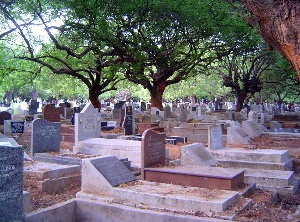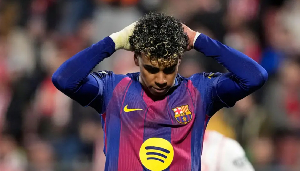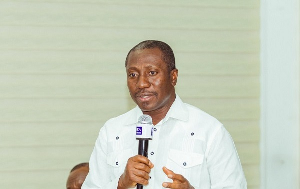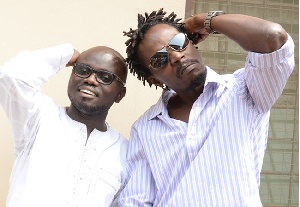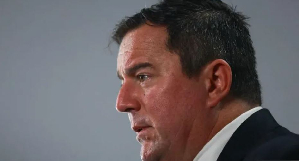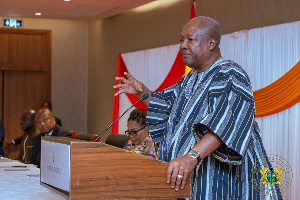The spokesperson for the GaDangbe Council and former Minister for Justice and Attorney General has expressed the council's displeasure at the rapid rate at which non-indigenes are buried in the Greater Accra Region.
According to Nii Ayikoi Oto, hitherto non-indigenes were not buried in the capital region but now it is the order of the day because of overpopulation.
"And what is disheartening is that indigenes are not differentiated from non-indigenes.
"Not too long ago when non-indigenes died in the region, they were transported in a hearse to the place of their birth for burial.
"But everybody is buried here [now]," he said.
The former Attorney -General in the former president Kufuor regime raised issues with the trend of burying non-indigenes in the region while throwing more light on the statement issued by the GaDangme Council, the official mouth-piece of GaDangmes in Ghana on the construction of hostels for Kaayayei in Accra.
He spoke on the mid-day news on Accra 100.5 FM on Friday, February 24, 2023.
He argued that if there is a need for the government to build hostels for people, it should equally build them for people in Chorkor who are living in overpopulated situations and from the region.
Below are excerpts of the statement:
STATEMENT BY GADANGME COUNCIL ON CONSTRUCTION 0F HOSTEL FOR KAAYAYEI IN ACCRA
The attention of GaDangme Council, the official mouth-piece of GaDangmes in Ghana, has been drawn to an announcement in the dailies, that work has commenced for the construction of a hostel for Head Porters also known as Kaayayei at Agbogloshie Market.
The Council has observed that all Head Porters hail from Regions in the northern parts of Ghana who have moved South particularly to the capital city Accra as part of rural-urban migration to look for greener pastures.
It cannot be denied that since they have no vocational skills and are equally low income earners, they live from hand to mouth and are unable to rent rooms thus after plying their trade carrying goods in headpans for fees, in the day time, they end up sleeping on pavements infront of shops around Makola whilst others opt to stay with their kinsmen residing in makeshift structures at old Fadama or Agbogloshie or the place which used to be called Sodom and Gomorrah before that portion was demolished.
After the demolition, many relocated to their villages and all the onion and yam sellers were relocated and resettled at another part of Ga lands known as Adjen Kotoku.
However, the area across the Agbogbloshie Street where the Agbogloshie Market is situated was left intact and since then normal trading had been ongoing.
Recently, the digging of foundation trenches at Agbogbloshie Market for the commencement of works meant for construction of Hostel for Kaayayei, has excited the interest of GaDangmes in general and the GaDangme Council in particular.
We wish respectfully to note that to construct hostels for Head Porters is to encourage more unskilled female youth to migrate southwards because accommodation would be assured. In our view, however, the safest solution to the challenges confronting those who migrate to cities particularly Accra, the capital, is the provision of vocational and technical skills within the Regions where they migrate from. When that is done, the migrants having acquired skills, can go into local industries applying their vocational and technical skills to run their small scale businesses instead of moving South for nonexistent jobs and becoming a burden on both central and local governments.
We wish to remind ourselves that since, we are not experts in the field, we will leave further discussions to appropriate bodies to advise government on the best way forward to minimize the huge migrations.
Our immediate concern is that although the Constitution and other laws were used to either vest GaDangme lands in Government for its management and for compulsory acquisitions, yet the injunction that where the land is not used for the purpose for which it was acquired it should be returned to its original owners, is more honoured in its breach than the observance.
Again whilst vested lands can be devested and the land returned to its owners which we saw recently explicitly demonstrated when parts of Kumasi lands were devested and returned to the Asantehene, same has not happened to many vested lands in Accra.
The land on which the Kaayayei hostel is to be constructed was originally compulsorily acquired by the Government of Ghana for development into a recreational area, which would have included stadium, restaurants, cafeteria, boating and yacht club, open air cinema, hotel and restaurant, boat hiring, botanical gardens, public swimming pool, birds aviary, public tennis courts, bamboo bush hut, children play grounds, sightseeing terraces, paddle boat hiring, cricket oval, badminton courts, volley-ball and football pitches, net-ball, basket-ball and hockey pitches and boat racing etc.
A scheme known as Korle Lagoon Recreational Planning Scheme was developed to capture the above. Another project called the Accra Korle Lagoon Ecological Restoration Project (KLERP) was approved and funds were sourced from Kuwait, aimed at improving the ecology of the Lagoon by eliminating the material inflows that are clogging the river basin through sanitation control.
The project did not yield the expected dividends due to the activities of those then residing at Sodom and Gomorrah.
Eventually, the land use was changed to a Market when Makola could no longer accommodate traders.
Today, with the commencement of the construction of hostels, it is ample testimony that the original purpose has been abandoned. That being the case, the Council is of a strong conviction that in accordance with the Constitution and laws, the land should be returned to the original owners.
The injustice involved in what is happening is that the Ga lands are to be used to resettle non-indigenes whilst there are several homeless indigenes living on the streets fighting for space and accommodation at Bukom, James Town, Chorkor and generally along the coast with no room for expansion.
Even with the Government Estates which provide accommodation, the beneficiaries have embarked on massive extensions thereby rendering it impossible for there to be open spaces for social gathering.
Therefore, since these indigenes also require land for construction and settlement, we propose that the land in question, be handed over to the Greater-Accra Regional Lands Commission to be held in trust and with the collaboration of the composite Ga, Gbese and Korle Stools and James Town Stool and the GaDangme Council for same to be parceled out to deserving indigenes to use to provide accommodation for themselves.
In the result, we suggest that the idea of using the specific land in question to construct Hostels for Head Porters or Kaayayei to be permanently abandoned and alternative solutions found for their plight.
General News of Friday, 24 February 2023
Source: classfmonline.com

